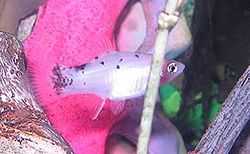Xiphophorus
| Xiphophorus | |
|---|---|
 | |
| Green swordtail, Xiphophorus hellerii | |
| Scientific classification | |
| Kingdom: | Animalia |
| Phylum: | Chordata |
| Class: | Actinopterygii |
| Order: | Cyprinodontiformes |
| Family: | Poeciliidae |
| Genus: | Xiphophorus Heckel, 1848 |
| Type species | |
| Xiphophorus hellerii Heckel, 1848 | |
| Species | |
|
See text. | |
Xiphophorus is a genus of euryhaline and freshwater fishes in the family Poeciliidae of order Cyprinodontiformes. The many Xiphophorus species are all called either platyfish (or platies) or swordtails. The type species is X. hellerii, the green swordtail. Platyfish and swordtails are live-bearers, meaning that they reproduce via internal fertilization. The name Xiphophorus derives from the Greek words ξίφος (dagger) and φόρος (bearer), referring to the gonopodium.
The various Xiphophorus species are native to areas of Belize, Guatemala, Honduras, and especially Mexico. All small fishes, which reach maximum lengths of 3.5–16 cm (1.4–6.3 in) depending on the exact species.[1] Three species and their hybrids are common in the aquarium trade: the green swordtail (X. hellerii), the southern platyfish (X. maculatus) and the variable platyfish (X. variatus). IUCN lists two Xiphophorus species, the marbled swordtail (X. meyeri) and the northern platyfish (X. gordoni), as Endangered, while the Monterrey platyfish (X. couchianus) is listed as Critically Endangered.
Human uses
Xiphophorus species are regularly used in genetic studies, and scientists have developed many interspecific hybrids.[2] The Xiphophorus Genetic stock center, founded by Myron Gordon in 1939, is an important source of these fish for research.[3]
In addition, several species are commonly kept by aquarium hobbyists, especially X. helleri, X. maculatus, and X. variatus. In fact, these are a key category in fishkeeping, a group of extremely hardy livebearing fish, along with the molly and guppy, that adapt to almost any water conditions, from cold to tropical, freshwater to fully marine. Unlike some species, these are available almost completely as captive-raised, because of the ease with which they breed.
Species

The currently recognized species in this genus, according to FishBase, are:[1] but see.[4]
- Xiphophorus alvarezi D. E. Rosen, 1960 (Chiapas swordtail)
- Xiphophorus andersi M. K. Meyer & Schartl, 1980 (spiketail platyfish)
- Xiphophorus birchmanni Lechner & Radda, 1987 (sheepshead swordtail)
- Xiphophorus clemenciae Álvarez, 1959 (yellow swordtail)
- Xiphophorus continens Rauchengerger, Kallman & Morizot, 1990 (short-sword platyfish)
- Xiphophorus cortezi D. E. Rosen, 1960 (delicate swordtail)
- Xiphophorus couchianus (Girard, 1859) (Monterrey platyfish)
- Xiphophorus evelynae D. E. Rosen, 1960 (Puebla platyfish)
- Xiphophorus gordoni R. R. Miller & W. L. Minckley, 1963 (northern platyfish)
- Xiphophorus hellerii Heckel, 1848 (green swordtail)
- Xiphophorus kallmani M. K. Meyer & Schartl, 2003
- Xiphophorus kosszanderi M. K. Meyer & Wischnath, 1981, sometimes considered a natural hybrid in which case the name would be invalid[4]
- Xiphophorus maculatus (Günther, 1866) (southern platyfish)
- Xiphophorus malinche Rauchengerger, Kallman & Morizot, 1990 (highland swordtail)
- Xiphophorus mayae M. K. Meyer & chartl, 2002
- Xiphophorus meyeri Schartl & Schröder, 1988 (marbled swordtail)
- Xiphophorus milleri D. E. Rosen, 1960 (Catemaco platyfish)
- Xiphophorus mixei Kallman, Walter, Morizot & Kazianis, 2004 (Mixe swordtail)
- Xiphophorus montezumae D. S. Jordan & Snyder, 1899 (Montezuma swordtail)
- Xiphophorus monticolus Kallman, Walter, Morizot & Kazianis, 2004 (southern mountain swordtail)
- Xiphophorus multilineatus Rauchengerger, Kallman & Morizot, 1990
- Xiphophorus nezahualcoyotl Rauchengerger, Kallman & Morizot, 1990 (mountain swordtail)
- Xiphophorus nigrensis D. E. Rosen, 1960 (Panuco swordtail)
- Xiphophorus pygmaeus C. L. Hubbs & Gordon, 1943 (pygmy swordtail)
- Xiphophorus roseni M. K. Meyer & Wischnath, 1981, sometimes considered a natural hybrid in which case the name would be invalid[4]
- Xiphophorus signum D. E. Rosen & Kallman, 1969
- Xiphophorus variatus (Meek, 1904) (variable platyfish)
- Xiphophorus xiphidium (Gordon, 1932) (swordtail platyfish)
References
- "Xiphophorus". Integrated Taxonomic Information System. Retrieved 9 December 2004.
- ↑ 1.0 1.1 Froese, Rainer, and Daniel Pauly, eds. (2012). Species of Xiphophorus in FishBase. August 2012 version.
- ↑ http://www.xiphophorus.txstate.edu/stockcenter/galleries/hybrid.html
- ↑ http://www.xiphophorus.txstate.edu/about/introduction.html
- ↑ 4.0 4.1 4.2 H. R. Axelrod & L. Wischnath, 1991
External links
- xiphophorus.org
- xiphophorus.net(Chinese ver.)